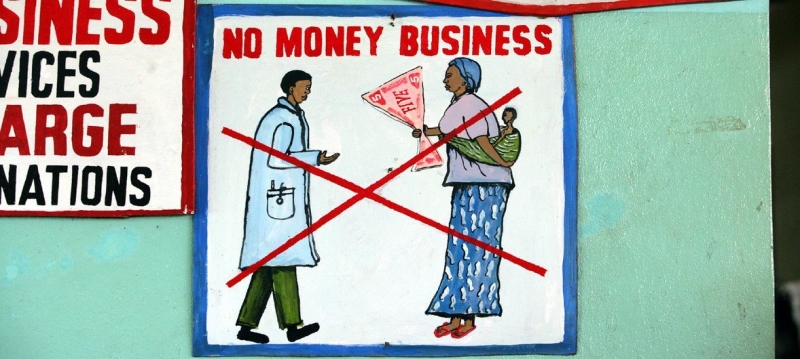
A poster at a hospital in Liberia urging patients not to bribe doctors UN calls for youth to be heard against corruption Economic Development
Corruption is a barrier to a better future for young people, limiting their access to quality education, jobs, public services, sports and a clean planet. On International Anti-Corruption Day on December 9, the UN is reminding people of its devastating impact.
The annual volume of bribes on a global scale is one trillion dollars. In total, the world economy loses 2.6 trillion dollars due to corruption – more than five percent of global GDP. They could be used to help children and people with disabilities, to promote gender equality, to fight poverty and climate change.
Youth against corruption
There are 1.9 billion young people in the world. So, the fight against corruption is vital for the future of almost a quarter of the planet’s population.
This year’s theme – “Unite with Youth against Corruption: Creating a Fair Future” – recalls the important role of young activists who stand up for truth and integrity. Their task, among other things, is to raise awareness about corruption and its destructive impact on communities. The information campaign, which will continue in 2024 and 2025, will give the leaders of tomorrow the opportunity to express their thoughts, concerns and hopes so that their voices are heard and taken into action.
In anticipation of the campaign, the United Nations Office on Drugs and Crime (UNODC) launched an international essay competition to invite young people from around the world to share their stories of how corruption impacts their lives, families and communities, and how civil society is working to prevent and combat it.
Losing Potential to Greed
After reviewing a total of 1,331 essays from more than 100 countries, UNODC selected 26 winners, representing 21 countries in all regions of the world.
“Corruption destroys a country; it destroys lives and their futures. “It allows criminals with money to feel free and safe, and politicians to think that they can do whatever they want just by getting paid,” wrote Saliman Nasypbekova from Kyrgyzstan in her essay.
“But it also makes ordinary people feel unwanted and wrong. It makes people ashamed to talk about problems and leaves them without hope. Corruption keeps people silent and it slowly destroys our society. With this mindset, future generations will think that they can break the law and get away with it with money. “It amazes me how a country with beautiful nature and a bright future can lose its potential because of the greed of people,” she continued.
“Political education, especially in matters of honesty and the fight against corruption, is important so that every child can become a better person and citizen of the Earth,” the young activist concluded.
“Cancer of State Institutions”
According to Pablo Perez Lopez from Spain, corruption is the cancer of state institutions. Once it appears in one place, it spreads quickly and destroys everything in its path.
“Corruption in recent decades in my country has been concentrated in political intrigue, money laundering, nepotism, and political privileges. This hinders the country’s development by diverting society’s resources to less competitive projects or directly taking funds away from society. This creates growing inequality in the country by redistributing money to the spheres of political power and capital. Thus, the country’s long-term growth is limited,” the young man noted in his essay.
